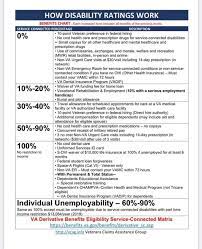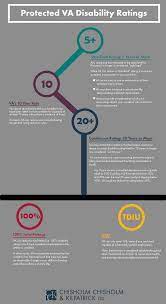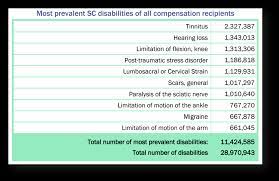Service-Connected Disability Benefits: Supporting Those Who Served
For those who have served in the military, the sacrifices made in the line of duty can often result in long-lasting physical or mental health issues. To address these challenges, the U.S. Department of Veterans Affairs (VA) offers service-connected disability benefits to provide financial support and medical care for veterans who have incurred disabilities or illnesses as a result of their military service.
Service-connected disability benefits are designed to compensate veterans for disabilities that are directly connected to their time in service. These disabilities can range from physical injuries sustained during combat to mental health conditions developed as a result of traumatic experiences. The VA acknowledges that these disabilities can significantly impact a veteran’s quality of life and ability to earn a living post-service.
One of the primary benefits provided through this program is compensation payments. The amount of compensation is based on the severity of the disability, which is determined by the VA through a rating system ranging from 0% to 100%. A higher rating signifies a more severe disability and results in greater compensation. This financial support aims to assist veterans in maintaining their livelihoods despite any limitations caused by their service-connected disabilities.
In addition to compensation, eligible veterans also gain access to free or low-cost healthcare services through the VA healthcare system. This includes medical treatment, medications, and specialized care for service-related conditions. By providing comprehensive healthcare options tailored specifically to veterans’ needs, the VA ensures that those who have served receive appropriate and timely medical attention.
Applying for service-connected disability benefits may seem like a daunting task, but there are resources available to help veterans navigate the process. The first step is filing a claim with the VA, providing evidence such as medical records or statements from healthcare professionals that establish a connection between the disability and military service. It’s essential for veterans to gather all relevant documentation and be prepared for potential evaluations by VA physicians or specialists.
To further support veterans seeking these benefits, numerous organizations and advocacy groups provide guidance and assistance throughout the application process. These resources can help veterans understand their rights, gather necessary evidence, and ensure that their claims are properly submitted. It’s crucial for veterans to take advantage of these support networks to maximize their chances of receiving the benefits they deserve.
Service-connected disability benefits play a vital role in recognizing the sacrifices made by our nation’s veterans. By providing financial support and access to healthcare services, these benefits aim to alleviate the burdens faced by those who have served. They serve as a reminder that our society values and appreciates the dedication and sacrifices made by our military personnel.
If you or someone you know is a veteran dealing with service-related disabilities, it is essential to explore the available resources and apply for service-connected disability benefits. The VA and various supporting organizations are there to assist in this process, ensuring that veterans receive the care and support they need to lead fulfilling lives after their service to our country.
6 Essential Tips for Service-Connected Disability Benefits
- Gather all the necessary documents and information to support your claim for service-connected disability benefits.
- Make sure to submit your application as soon as possible after you have been discharged from the military.
- Be aware that it can take several months or even years for a decision on your disability claim to be made, so plan accordingly and stay in contact with the VA throughout the process.
- Understand that you will need to provide medical evidence of your disability in order to receive benefits, so make sure you have all of this documentation ready when submitting your claim.
- Be prepared for appeals if needed – there is an appeals process for those who are denied service-connected disability benefits, so familiarize yourself with this process if necessary and make sure you follow all instructions carefully when filing an appeal.
- Reach out for help if needed – there are many organizations that offer assistance with filing claims or appealing decisions related to service-connected disabilities, so don’t hesitate to ask for help if needed!
Gather all the necessary documents and information to support your claim for service-connected disability benefits.
Gather the Evidence: Supporting Your Claim for Service-Connected Disability Benefits
When applying for service-connected disability benefits, one of the most crucial steps is gathering all the necessary documents and information to support your claim. This evidence is essential in establishing a clear connection between your disability and your military service, increasing your chances of receiving the benefits you deserve.
To start, it’s important to gather your medical records. These records should include any documentation related to injuries, illnesses, or conditions that occurred during your time in service or were aggravated by it. This can include hospital records, doctor’s notes, test results, and any other relevant medical documents that provide a comprehensive overview of your health history.
Additionally, obtaining statements from healthcare professionals who have treated you is valuable evidence. Their expert opinions can help establish a direct link between your disability and your military service. These statements should clearly outline how your condition is related to specific incidents or exposures during your time in the military.
If you have already received treatment outside of the VA healthcare system for your service-connected disability, be sure to gather those medical records as well. These records can provide valuable insights into the progression of your condition and any additional treatments or therapies you have undergone.
Other supporting documents may include personal statements detailing how your disability has affected various aspects of your life. This can include information on how it impacts daily activities, employment opportunities, relationships, and overall quality of life. Providing a comprehensive picture of how the disability hinders your ability to function normally helps strengthen your claim.
It’s also important to gather any relevant service records such as deployment orders, performance evaluations, incident reports, or witness statements that can corroborate events leading to or exacerbating your disability. These records serve as crucial evidence in establishing a clear link between specific incidents during military service and the development or worsening of your condition.
Lastly, keep track of any correspondence with healthcare providers or representatives from the VA regarding treatment for your disability. This can include appointment summaries, prescription information, and any other documentation that demonstrates your ongoing efforts to manage your condition.
By gathering all the necessary documents and information to support your claim, you are providing the VA with a comprehensive and compelling case for service-connected disability benefits. Remember to organize these documents in a clear and easily accessible manner, as it will help streamline the application process.
If you have any doubts or concerns about what specific documents are required or how to gather them effectively, don’t hesitate to reach out to organizations or advocates specializing in assisting veterans with their claims. They can provide valuable guidance and ensure that you have all the necessary evidence to support your case.
Remember, thorough preparation and documentation significantly increase your chances of receiving the service-connected disability benefits you deserve. Take the time to gather all relevant information, as it will play a crucial role in securing the financial support and medical care you need as a result of your military service-related disability.
Make sure to submit your application as soon as possible after you have been discharged from the military.
Timely Application: Maximizing Your Service-Connected Disability Benefits
When it comes to applying for service-connected disability benefits, timing is crucial. One important tip to remember is to submit your application as soon as possible after you have been discharged from the military. Doing so can significantly increase your chances of receiving the benefits you deserve.
Applying promptly has several advantages. Firstly, it allows you to provide accurate and detailed information about your disability while the memories are still fresh in your mind. Recalling specific incidents or symptoms related to your service-connected condition becomes easier when you apply soon after discharge.
Secondly, submitting your application early ensures that there are no unnecessary delays in processing. The sooner you start the process, the sooner the U.S. Department of Veterans Affairs (VA) can review your case and make a decision regarding your eligibility for benefits. By avoiding any potential backlog or administrative issues, you’re more likely to receive a prompt response.
Additionally, applying early allows you to begin receiving compensation payments or accessing healthcare services sooner. Service-connected disabilities can have a significant impact on your life and finances, so obtaining timely support is crucial for maintaining stability and addressing any immediate needs arising from your condition.
To ensure a smooth application process, it’s essential to gather all relevant documentation before submitting your claim. This includes medical records, statements from healthcare providers, incident reports, and any other evidence that supports the connection between your disability and military service. By having these documents ready when you apply, you can provide a comprehensive overview of your situation right from the start.
If you’ve missed the opportunity to apply immediately after discharge, don’t worry; it’s never too late to pursue service-connected disability benefits. However, keep in mind that delays may affect the effective date of your benefits if approved. The effective date determines when compensation payments will begin and how much back pay you may be entitled to.
Navigating the complexities of applying for service-connected disability benefits can be overwhelming, but there are resources available to assist you. The VA, veteran service organizations, and legal professionals specializing in veterans’ affairs can provide guidance and support throughout the process. They can help ensure that your application is complete, accurate, and submitted in a timely manner.
Remember, time is of the essence when it comes to service-connected disability benefits. By submitting your application as soon as possible after your military discharge, you increase your chances of receiving the financial support and healthcare services that recognize the sacrifices you made while serving our country.
Be aware that it can take several months or even years for a decision on your disability claim to be made, so plan accordingly and stay in contact with the VA throughout the process.
Navigating the Service-Connected Disability Benefits Process: Patience and Persistence
If you’re a veteran applying for service-connected disability benefits, it’s important to be aware that the decision-making process can take time. It’s not uncommon for it to take several months or even years before a final decision is reached on your claim. Therefore, it’s crucial to plan accordingly and maintain regular contact with the U.S. Department of Veterans Affairs (VA) throughout the entire process.
The timeline for processing disability claims can vary depending on various factors such as the complexity of your case, the availability of supporting evidence, and the workload of the VA. While it may be frustrating to experience delays, it’s essential to remain patient and persistent.
During this waiting period, staying in contact with the VA is crucial. Keep track of any correspondence you receive from them and promptly respond to any requests for additional information or documentation. Regularly check the status of your claim online through the VA’s eBenefits portal or by contacting their toll-free number.
Maintaining open lines of communication with the VA ensures that you stay informed about any updates or changes in your claim status. It also allows you to address any concerns or questions that may arise during the process.
In addition to staying connected with the VA, consider seeking assistance from veteran service organizations or accredited representatives who specialize in helping veterans navigate through disability claims. These organizations can provide valuable guidance and support, ensuring that your claim is properly prepared and submitted.
While waiting for a decision on your disability claim can be challenging, it’s important not to lose hope. The VA is committed to providing fair evaluations and reaching accurate decisions regarding service-connected disabilities. Remember that every case is unique, and thorough review processes are in place to ensure fairness and accuracy.
Finally, plan ahead financially during this waiting period. Recognize that it may take time before you start receiving compensation payments if your claim is approved. Having a financial safety net or seeking assistance from other support programs can help alleviate any financial strain you may experience while waiting for a decision.
In conclusion, when applying for service-connected disability benefits, be prepared for a potentially lengthy process. Stay in contact with the VA, seek assistance from veteran service organizations, and plan your finances accordingly. Remember that your patience and persistence will ultimately contribute to a fair and accurate decision on your claim.
Understand that you will need to provide medical evidence of your disability in order to receive benefits, so make sure you have all of this documentation ready when submitting your claim.
Service-Connected Disability Benefits: The Importance of Medical Evidence
When applying for service-connected disability benefits, one crucial aspect to keep in mind is the need for medical evidence. The U.S. Department of Veterans Affairs (VA) requires documentation that establishes a clear connection between your disability and your military service. It is essential to gather all the necessary medical records and have them ready when submitting your claim.
Medical evidence serves as the foundation for your claim, providing the VA with the information they need to evaluate the severity and impact of your disability accurately. This evidence can include doctor’s reports, hospital records, test results, and statements from healthcare professionals who have treated or evaluated you.
By providing comprehensive medical documentation, you strengthen your case and increase the likelihood of a favorable outcome. It helps establish a clear link between your military service and the disability you are claiming, ensuring that the VA understands the direct impact it has had on your health.
To ensure you have all necessary documentation ready when submitting your claim, start by gathering any medical records related to your disability. Reach out to healthcare providers who have treated you for this condition and request copies of relevant reports or test results. If possible, obtain statements from these professionals that explicitly state how your military service contributed to or aggravated your disability.
It’s important not to overlook any supporting evidence that may strengthen your claim. This can include X-rays, MRI scans, laboratory test results, or any other diagnostic tests relevant to your condition. These documents provide objective evidence of the existence and severity of your disability.
Additionally, if you have received treatment outside of VA facilities, it’s crucial to include those records as well. Private doctors’ reports or records from non-VA hospitals can provide valuable insights into the progression or treatment history of your condition.
Remember that accuracy and completeness are key when submitting medical evidence. Take the time to review all documents before including them with your claim. Ensure they are up-to-date, clearly indicate your diagnosis, and include a thorough description of your symptoms and limitations.
By understanding the importance of medical evidence and preparing all necessary documentation beforehand, you can streamline the claims process and increase your chances of receiving the service-connected disability benefits you deserve. If you need assistance or have questions regarding the required evidence, reach out to veterans’ organizations or advocacy groups that specialize in helping veterans navigate this process.
Your military service has left a lasting impact on your life, and it is crucial to ensure that you receive the support you need. By providing comprehensive medical evidence, you demonstrate the direct connection between your disability and your time in service, ultimately helping the VA make an informed decision about your claim.
Be prepared for appeals if needed – there is an appeals process for those who are denied service-connected disability benefits, so familiarize yourself with this process if necessary and make sure you follow all instructions carefully when filing an appeal.
Be Prepared for Appeals: Navigating the Service-Connected Disability Benefits Process
When applying for service-connected disability benefits, it’s important to be aware that not all claims are approved on the first attempt. If you find yourself denied benefits, don’t lose hope. The U.S. Department of Veterans Affairs (VA) offers an appeals process that allows you to challenge their decision and present additional evidence to support your case.
If you receive a denial for service-connected disability benefits, it’s crucial to familiarize yourself with the appeals process. Understanding this process will help you navigate through the necessary steps and increase your chances of a successful appeal. Here are some key points to keep in mind:
- Review the denial letter: Carefully read the letter provided by the VA explaining why your claim was denied. This will give you insight into the specific reasons behind their decision and help you identify any areas that need further clarification or evidence.
- Seek assistance: Consider reaching out to veterans’ service organizations or legal professionals who specialize in VA benefits claims. These experts can provide valuable guidance and support throughout the appeals process, ensuring that you’re well-prepared and have a strong case.
- Gather additional evidence: One of the most critical aspects of an appeal is presenting new evidence that supports your claim for service-connected disability benefits. Collect any relevant medical records, statements from healthcare providers, or other documentation that reinforces your case. Be thorough and ensure all evidence is organized and clearly presented.
- File a Notice of Disagreement (NOD): To initiate an appeal, submit a Notice of Disagreement form to your local VA regional office within one year from receiving the denial letter. This document expresses your intent to challenge their decision and provides an opportunity to present new evidence during the review process.
- Request a Decision Review Officer (DRO) review or a Board of Veterans’ Appeals (BVA) hearing: After filing the NOD, you can choose to have a Decision Review Officer (DRO) review your case or request a hearing before the Board of Veterans’ Appeals (BVA). Each option has its own advantages, so consult with an expert to determine which is best for your situation.
- Follow instructions carefully: Throughout the appeals process, it’s essential to carefully follow all instructions provided by the VA. Missing deadlines or failing to provide requested information can result in delays or even dismissal of your appeal.
Remember, appealing a denial for service-connected disability benefits requires patience and perseverance. It’s important to stay proactive, seek assistance when needed, and present compelling evidence to support your claim. The appeals process exists to ensure that deserving veterans receive the benefits they rightfully deserve.
By being prepared and knowledgeable about the appeals process, you can navigate through any challenges that may arise and increase your chances of a successful outcome. Don’t give up – continue advocating for yourself and your entitlements as a veteran who has served our country with honor and dedication.
Reach out for help if needed – there are many organizations that offer assistance with filing claims or appealing decisions related to service-connected disabilities, so don’t hesitate to ask for help if needed!
Reach out for Help: Navigating Service-Connected Disability Benefits
Applying for service-connected disability benefits can be a complex and sometimes overwhelming process. From gathering the necessary evidence to understanding the intricate paperwork, it’s understandable if veterans feel unsure about where to start. However, there is no need to face this journey alone. If you find yourself in need of assistance, remember that numerous organizations are available to lend a helping hand.
When it comes to filing claims or appealing decisions related to service-connected disabilities, reaching out for help can make a significant difference in your experience and outcome. Many organizations specialize in supporting veterans through this specific process and have extensive knowledge of the system.
These organizations can provide guidance on how to navigate the paperwork, gather crucial evidence, and ensure that your claim is properly submitted. They understand the intricacies of the application process and can offer valuable insights based on their experience with similar cases. By seeking their assistance, you increase your chances of receiving the benefits you deserve.
Not only do these organizations offer practical support, but they also provide emotional support during what can be a challenging time. They understand the frustrations and complexities involved in dealing with service-connected disabilities and can offer empathy and understanding throughout the process.
To find these organizations, consider reaching out to local veterans’ service offices or contacting national veterans’ advocacy groups. These entities often have dedicated staff or volunteers who specialize in assisting veterans with disability claims. Additionally, online resources and forums can provide recommendations based on others’ experiences.
Remember, there is no shame in asking for help when it comes to navigating service-connected disability benefits. The journey towards receiving these benefits is not one that you have to undertake alone. By reaching out for assistance from knowledgeable organizations, you are taking proactive steps towards obtaining the support you deserve.
So don’t hesitate—seek out these resources if needed! Reach out for help from organizations that specialize in supporting veterans through the claims process. Their expertise and support can make a significant difference in your journey towards receiving the service-connected disability benefits you are entitled to. Remember, you served our country with honor, and now it’s time to let others serve you by providing the assistance you need.




